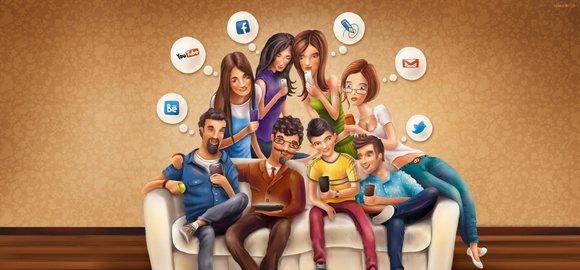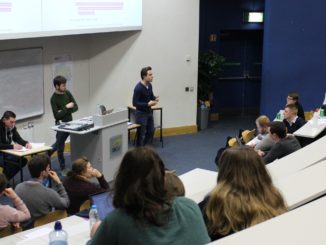
Agree:
First, a surrender to a salient point: yes, social media has transformed the way people communicate with each other at home and across the world.
There is no denying that the cultural and technological revolutions brought forward by the Internet and those who have capitalized on it are not good things. Only a complete philistine would argue that change is inherently negative.
But there is that negative. And it’s not hard to see the upheaval brought forward to a person on an individual scale.
It starts with Mark Zuckerberg’s posited idea of everyone in the world living on the Internet. What you do, who you are, your likes and dislikes, wants and needs, hobbies and interest, your photos, your memories, all living in the great cloud of the Net. The idea of a person’s identity codified and collated through a collection of likes and tags.
Now your movements are codified. Your personal details given up and fed through binary algorithms to determine what should be best targeted to you. Pasted together into a collage meant to stand for you.
Does anyone who look at a Facebook profile really think they are getting the best sense of what a person is like? That if they look through their photos and statuses they will truly know how that person is, what they are like?
Maybe this is just the carping of an old soul who doesn’t get what these darned kids are into these days. Apparently, most younger kids don’t even bother with Facebook anymore, having moved on to more stripped down but more engaging services such as Snapchat and Tinder. Share those fleeting moments. Judge a person’s desirability with a swipe. So much decided with so few decisions.
And it’s so easy to twist into maliciousness. Just look at the horrific movement of the past year created in the bowels of Twitter, #Gamergate. For those who don’t know, it’s a movement of angry gamers who believe feminist creators are polluting the gaming culture they hold so dearly.
Now there are people who look at a notification with dread rather than joy. People who have received death threats and horrible slurs for simply daring to ask for something different. And all of that so easily facilitated by the instant gratification that powers the best of social media. Tweet a death threat and it reaches your target soon after you hit Send.
I can’t be truly down on the Internet. One of my dearest friends is an owl obsessed anime nerd from Oregon who loves owls and her Canadian girlfriend so much. She is one of the coolest people I know. But that relationship was built over years of joy and pain. Not something so easily acquired with a swipe or a snap.
I wonder how the kids of tomorrow will grow up. I know, a cheap point to make: think of the children! But I do wonder how they will live as everyone else increasingly surrenders themselves to the net. And how much we’ll have left.
Leandro Pondoc
Disagree:
Technology has changed rapidly in the past decade and social media has engulfed our lives. With this causing such major social changes, it is redundant to glorify the social media free days that have been firmly left behind. Technology is incapable of moving backwards.
Once upon a time, events were organised by the sending of physical, handwritten invitations. I should know, my mother made me write all of mine for my eighth birthday in pink gel pen. Today, everything is organised through social media. Group chats help us plan nights out. Facebook events and apps offer free admission into nightclubs by simply liking or commenting on a page. The morning after, we can enjoy watching drunken Snapchat stories over strong coffee and relive the memories through photos on Instagram. Social media doesn’t hamper our social lives, it positively encourages them.
Facebook founder, Mark Zuckerberg, said “Facebook was not originally created to be a company. It was built to accomplish a social mission – to make the world more open and connected.” Undoubtedly one of the greatest advantages of social media is the ease with which we can now maintain and build friendships. We are irrevocably connected as people and grouped together by job, place of study or location by Facebook or Twitter’s operating systems. The internet is literally trying to make friends for us and the argument that the friendships built online are less valid than those in “real life” is flawed. Behind every computer is real person.
The human links encouraged by social media not only impact your social life, but can help you in your professional or academic pursuits. I don’t know where I’d be without the JR1 Facebook group reminding me of assignments we have due, or sites like Jobs Direct for finding out what work opportunities there are in my area. Social networks can lead to very real opportunities and success.
The final spear that people like to throw at the heart of social networking sites is the claim that they lead to antisocial behaviour and downright narcissism. We are the “selfie generation”, a title used scathingly by people less connected with the culture. What people fail to realise is that our social media activity leaves an indestructible trace on the internet, and while this can be negative, it also provides us with the most comprehensive scrapbook we’ll ever have. Pictures you put up at your first teenage disco are still on Facebook, years after you forgot about your dodgy haircut or terrible dress sense. Chances are, they’ll be there when your kids are going to their first disco. Isn’t it amazing that without investing any time or effort, you have a digital history of your life to share with people in the future?
Social media doesn’t just enhance our social lives in the present, but will continue to do so for years to come and is an irreversible, invaluable social improvement.
Rebecca Lumley




True dat